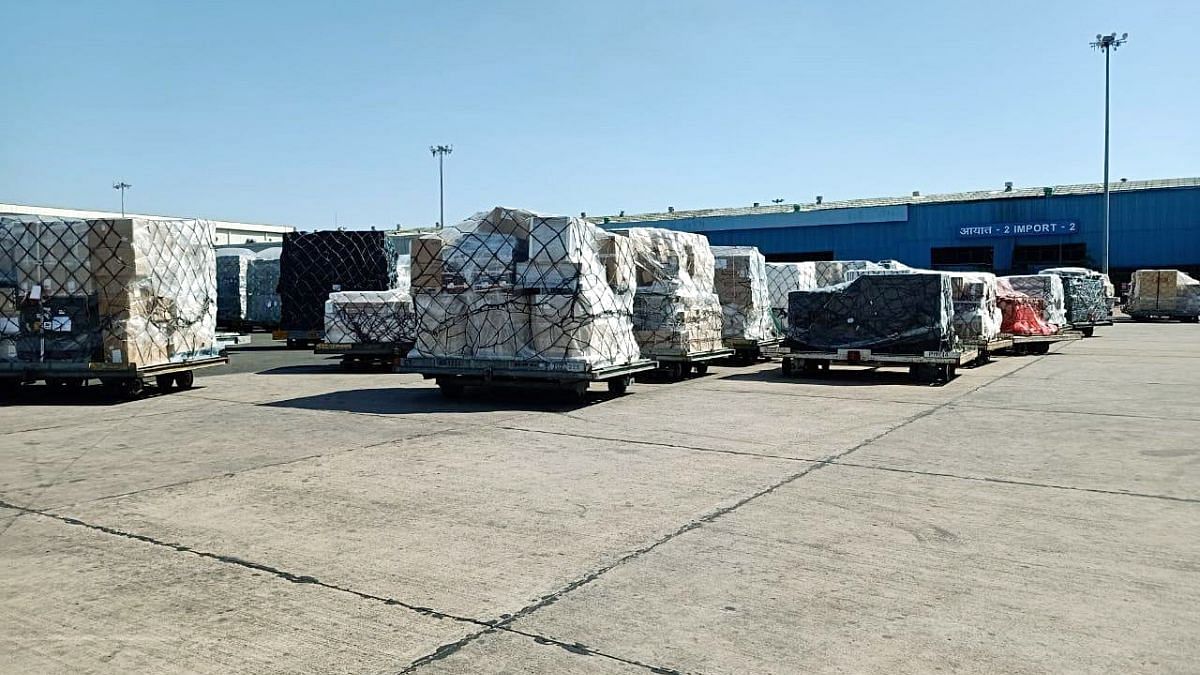New Delhi: Citing severe congestion at Delhi airport because of which airlines have started charging three times the normal tariff, Indian garment exporters have asked the central government to stop allowing transshipment of Bangladeshi goods to third countries via Delhi.
The congestion at the Delhi airport is due to the Red Sea crisis, which has forced companies to use air routes for export of goods.
While New Delhi and Dhaka have, over the past two years, taken collaborative steps in terms of transit and transshipment of goods, India has also been pushing its domestic textile sector to achieve a $100 billion export target by 2030 and compete with other garment giants in Asia, such as Bangladesh, Vietnam and China.
Meanwhile, Bangladesh has grown into a garment powerhouse, manufacturing for major clothing brands like H&M, Zara, Tommy Hilfiger, Gap, Calvin Klein and Hugo Boss — giving stiff competition to their counterparts in India.
Apparel Export Promotion Council (AEPC), India’s official body of apparel exporters, Thursday requested the Central Board Of Indirect Taxes and Customs (CBIC) to roll back its circular dated 7 February that allowed transshipment of Bangladesh export cargo to third countries through Delhi Air Cargo complex. Previously, these goods were allowed only through Kolkata airport.
“The continuing Red Sea crisis has already increased logistical costs for the exporters and it has also led to shift of export shipments from sea to air mode. At this crucial time, allowing Bangladeshi export cargo from Delhi Air Cargo Terminal will further increase the logistical challenges and increase the transportation cost for apparel exporters,” said Sudhir Sekhri, AEPC chairman, in a statement Thursday.
Due to carrying capacity overload at the Delhi airport, airlines have allegedly begun charging three times the normal tariff to exporters over the past two months.
According to industry estimates, air freight rates for US-bound goods, which were previously at Rs 150-160/kg, are now Rs 450/kg, while rates for Europe-bound goods have increased to Rs 300/kg from Rs 80-100/kg.
Unlike exporters from India, those from Bangladesh can afford higher rates as they enjoy benefits from the Generalized System of Preferences (GSP) in Europe and Western markets, AEPC spokesperson Sameer Pushp told ThePrint.
GSP schemes remove import duties from products coming from developing countries.
ThePrint reached the Indian commerce ministry through email, messages and calls on whether it would meet the demands of domestic exporters. This report will be updated if and when a response is received.
Also Read: Fighting over Tangail saree GI tag won’t do India-Bangladesh any good. It’s a shared legacy
Red Sea crisis and surge in cargo
Exporters argue that the Bangladeshi cargo is only worsening the strain on shipments caused by the Red Sea crisis, where Yemen’s Houthi rebels are attacking commercial ships amid the Israel-Hamas war.
“The heart of this issue is the Red Sea crisis. Ships are being diverted and taking two-three weeks longer to reach their destination. Buyers are placing fewer orders from India than projected. They’re shifting from shipping to air routes at exporters’ cost,” Gautam Nair, head of Matrix Clothing Private Ltd, told ThePrint.
“Bangladeshi shipments are only exacerbating the situation,” he added.
On 11 February, Delhi Cargo Service Centre (DCSC), which operates Cargo Terminal-2 of Delhi airport, issued a circular stating that the main reasons for an increase in tendered cargo since the start of February were due to the Red Sea crisis and “transfer cargo for export originating from Dhaka”.
The Bangladeshi cargo requires a dual method of screening, which leads to delays in handling and processing, it added.
Cargo volumes surged in February, with a high of 781 tonnes against an average of 300-400 tonnes. The average number of pieces of cargo screened in January stood at 19,000 while the average pieces screened a day in February was 25,000, according to a Delhi Cargo Service Centre (DSCS) Terminal report released on 11 February.
These are figures only for one of the two terminals at Delhi airport.
‘Reciprocal gesture’
The Indian government’s decision to allow the transshipment of Bangladesh exports via Delhi was widely viewed as a reciprocal move after Bangladesh allowed India access to Chattogram and Mongla ports by India for transit and transshipment of cargo last April.
In 2022, during her visit to India, Bangladesh Prime Minister Sheikh Hasina issued a joint statement with Prime Minister Narendra Modi under which it was agreed that India would allow Bangladesh to use land customs stations, airports and seaports within its territory for exporting goods.
Such reciprocal policies have also been noted by Faruque Hassan, the president of the Bangladesh Garment Manufacturers and Exporters Association (BGMEA), as an example of how the two neighbouring countries “do not compete” but rather “complement” each other, according to a report by Bangladeshi daily, The Business Standard.
If India suspended the transshipment of Bangladeshi goods through Delhi, economists in Bangladesh say, it could be seen as contrary to what was agreed under the joint statement.
“Bangladesh has also given India transit facilities through various land and coastal shipping agreements. It’s unlikely the circular will be reversed because it could be seen not only as protectionist measure but also contrary to providing reciprocal trade facilitation as agreed by the leaders of the two countries in the 2022 joint statement,” Mustafizur Rahman, a Distinguished Fellow at the Centre for Policy Dialogue (CPD), a Dhaka-based think tank, told ThePrint.
(Edited by Richa Mishra)
Also Read: Bangladesh thanks India for ‘standing by it’, backs country’s decision to fence border with Myanmar

